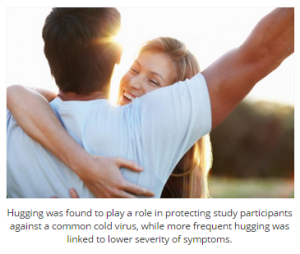When feeling down, a hug from a friend or a loved one can really lift those spirits. But a new study finds hugging may do more than make us feel better emotionally; it could help protect against viruses, such as the common cold.
Lead author Sheldon Cohen and colleagues, of the Dietrich College of Humanities and Social Sciences at Carnegie Mellon University in Pittsburgh, PA, found that frequent hugging – alongside good social support – may lower stress-induced susceptibility to infection, preventing or reducing the risk of illness.
The study – published in the journal Psychological Science – stemmed from the idea that hugging provides social support, as it represents having a close relationship with another person.
Cohen explains that past research has shown that people engaged in continuous conflict with others are less able to fight off cold viruses, while those who have social support appear to be protected from the psychological effects of stress, such as anxiety anddepression.
“We tested whether perceptions of social support are equally effective in protecting us from stress-induced susceptibility to infection and also whether receiving hugs might partially account for those feelings of support and themselves protect a person against infection,” he adds.
Hugs linked to lower risk of infection from cold virus
To reach their findings, the team asked 404 healthy adults to complete a questionnaire designed to determine their perceived social support. In addition, the participants engaged in 14 consecutive evening telephone interviews with the researchers, in which they discussed their conflicts with others and hugs they had received.
Next, subjects were deliberately exposed to a common cold virus and placed in quarantine while the researchers assessed any signs of infection and illness.
The researchers found that participants who reported having greater social support while experiencing conflicts were less likely to be infected by the cold virus, and hugs were found to be responsible for around a third of this protective effect.
What is more, participants who did become infected with the cold virus and who reported having greater social support and more frequent hugs displayed less severe symptoms than those who reported lower social support and fewer hugs, regardless of whether they experienced conflicts or not.
Cohen says these findings suggest that receiving a hug from a trusted person may trigger a sense of social support, and hugging more frequently could reduce the damaging effects of stress. Explaining the potential reasons behind this, he says:
“The apparent protective effect of hugs may be attributable to the physical contact itself or to hugging being a behavioral indicator of support and intimacy. Either way, those who receive more hugs are somewhat more protected from infection.”
Unlike hugging, kissing does not appear to have protective effects against infection. Last month, Medical News Todayreported on a study that found just one kiss for 10 seconds transfers around 80 million bacteria.
Written by Honor Whiteman
http://www.medicalnewstoday.com/articles/287242.php
